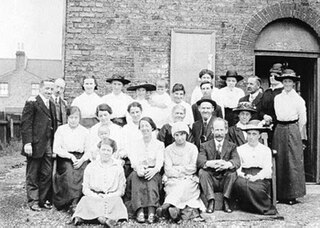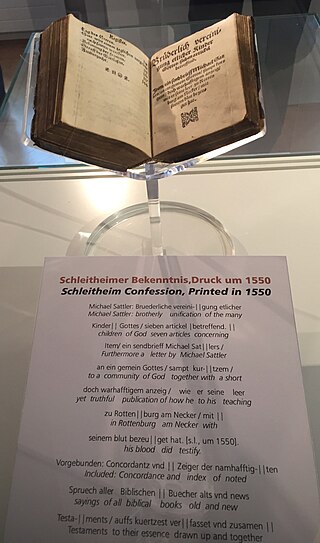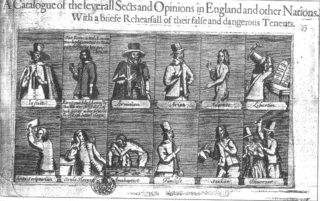Related Research Articles
Anabaptism is a Christian movement which traces its origins to the Radical Reformation in the 16th century. Anabaptists believe that baptism is valid only when candidates freely confess their faith in Christ and request to be baptized. Commonly referred to as believer's baptism, it is opposed to baptism of infants, who are not able to make a conscious decision to be baptized.
The Christadelphians are a restorationist and nontrinitarian Christian denomination. The name means 'brothers and sisters in Christ', from the Greek words for Christ (Christos) and brothers (adelphoi).

The Plymouth Brethren or Assemblies of Brethren are a low church and Nonconformist Christian movement whose history can be traced back to Dublin, Ireland, in the mid to late 1820s, where it originated from Anglicanism. The group emphasizes sola scriptura, the belief that the Bible is the only authority for church doctrine and practice. Plymouth Brethren generally see themselves as a network of like-minded free churches, not as a Christian denomination.
Restorationism, also known as Restitutionism or Christian primitivism, is a religious perspective according to which the early beliefs and practices of the followers of Jesus were either lost or adulterated after his death and required a "restoration". It is a view that often "seeks to correct faults or deficiencies, in other branches of Christianity, by appealing to the primitive church as normative model".

Independent Baptist churches are Christian congregations, generally holding to conservative Baptist beliefs. Although some Independent Baptist churches refuse affiliation with Baptist denominations, various Independent Baptist Church denominations have been founded.

The Old German Baptist Brethren (OGBB) is a Schwarzenau Brethren denomination of Anabaptist Christianity.
A Christian denomination is a distinct religious body within Christianity that comprises all church congregations of the same kind, identifiable by traits such as a name, particular history, organization, leadership, theological doctrine, worship style and, sometimes, a founder. It is a secular and neutral term, generally used to denote any established Christian church. Unlike a cult or sect, a denomination is usually seen as part of the Christian religious mainstream. Most Christian denominations refer to themselves as churches, whereas some newer ones tend to interchangeably use the terms churches, assemblies, fellowships, etc. Divisions between one group and another are defined by authority and doctrine; issues such as the nature of Jesus, the authority of apostolic succession, biblical hermeneutics, theology, ecclesiology, eschatology, and papal primacy may separate one denomination from another. Groups of denominations—often sharing broadly similar beliefs, practices, and historical ties—are sometimes known as "branches of Christianity". These branches differ in many ways, especially through differences in practices and belief.

The Schwarzenau Brethren, the German Baptist Brethren, Dunkers, Dunkard Brethren, Tunkers, or sometimes simply called the German Baptists, are an Anabaptist group that dissented from Roman Catholic, Lutheran and Reformed European state churches during the 17th and 18th centuries. German Baptist Brethren emerged in some German-speaking states in western and southwestern parts of the Holy Roman Empire as a result of the Radical Pietist revival movement of the late 17th and early 18th centuries, where people began to read and study their Bibles on their own- rather than just being told what to believe and do.

Maundy, or Washing of the Saints' Feet, Washing of the Feet, or Pedelavium or Pedilavium, is a religious rite observed by various Christian denominations. The word mandatum is the first word of the Latin Biblical quotation sung at the ceremony of the washing of the feet: "Mandatum novum do vobis ut diligatis invicem sicut dilexi vos", from the text of John 13:34 in the Vulgate. The ceremony commemorates the commandment of Christ that his disciples should emulate his loving humility in the washing of the feet. The medieval Latin term mandatum, came to apply to the rite of foot-washing on the Thursday preceding Easter Sunday, known in English as "Maundy Thursday" since at least 1530.
The Fellowship of Fundamental Bible Churches (FFBC) is a fellowship of independent, autonomous, fundament churches established in 1939. It is considered only a fellowship of like-minded churches, rather than a denomination. Local congregations in the fellowship have no financial obligations to the fellowship, and the fellowship exercises no control over them. It is only expected that the churches believe and teach Wesleyan theology, consistent with the Fundamentals of the Faith.

Anabaptist theology, also known as Anabaptist doctrine, is a theological tradition reflecting the doctrine of the Anabaptist Churches. The major branches of Anabaptist Christianity agree on core doctrines but have nuances in practice. While the adherence to doctrine is important in Anabaptist Christianity, living righteously is stressed to a greater degree.

The Exclusive Brethren are a subset of the Christian evangelical movement generally described as the Plymouth Brethren. They are distinguished from the Open Brethren from whom they separated in 1848.

English Dissenters or English Separatists were Protestants who separated from the Church of England in the 17th and 18th centuries. English Dissenters opposed state interference in religious matters and founded their own churches, educational establishments and communities. They tended to see the established church as too Catholic, but did not agree on what should be done about it.
Prima scriptura is the Christian doctrine that canonized scripture is "first" or "above all other" sources of divine revelation. Implicitly, this view suggests that, besides canonical scripture, there can be other guides for what a believer should believe and how they should live, such as the Holy Spirit, created order, traditions, charismatic gifts, mystical insight, angelic visitations, conscience, common sense, the views of experts, the spirit of the times or something else. Prima scriptura suggests that ways of knowing or understanding God and his will that do not originate from canonized scripture are perhaps helpful in interpreting that scripture, but testable by the canon and correctable by it, if they seem to contradict the scriptures. Prima scriptura is upheld by the Anglican and Methodist traditions of Christianity, which suggest that Scripture is the primary source for Christian doctrine, but that "tradition, experience, and reason" can nurture the Christian religion as long as they are in harmony with the Bible. Pentecostals generally uphold prima scriptura with an emphasis on the leading of the Holy Spirit rather than tradition.
Needed Truth Brethren, as they are sometimes known, call themselves “The Churches of God in the Fellowship of the Son of God, the Lord Jesus Christ". Although this is their official legal title, other Christians often classify them as a very conservative strain of the Plymouth Brethren, connexional in nature, and holding themselves separate from what they consider to be erroneous practices. The designation "Needed Truth" was given to them by others based on the Needed Truth Magazine, which began to be distributed among the Open Brethren in 1888. This magazine espoused what it considers a fresh understanding of biblical teaching of the proper constitution of the local church, principles of church government, and doctrinal subjects such as The House of God, the Church of God, the Kingdom of God, and the Body of Christ. The magazine presented these views as being a return to fundamental New Testament principles which had been forgotten.
The expression "one true church" refers to an ecclesiological position asserting that Jesus gave his authority in the Great Commission solely to a particular visible Christian institutional church—what is commonly called a denomination. This view is maintained by the Catholic Church, the Eastern Orthodox Church, the Oriental Orthodox communion, the Assyrian Church of the East, the Ancient Church of the East, and the Lutheran churches, as well as certain Baptists. Each of them maintains that their own specific institutional church (denomination) exclusively represents the one and only original church. The claim to the title of the "one true church" relates to the first of the Four Marks of the Church mentioned in the Nicene Creed: "one, holy, catholic, and apostolic church". As such, it also relates to claims of both catholicity and apostolic succession: asserting inheritance of the spiritual, ecclesiastical and sacramental authority and responsibility that Jesus Christ gave to the apostles.
The Open Brethren, sometimes called Christian Brethren, are a group of Evangelical Christian churches that arose in the late 1820s as part of the Assembly Movement within the Plymouth Brethren tradition. They originated in Ireland before spreading throughout the British Isles, and today they have an estimated 26,000 assemblies worldwide.
Nonconformity to the world, also called separation from the world, is a Christian doctrine based on Romans 12:2, 2 Corinthians 6:17 and other verses of the New Testament that became important among different Protestant groups, especially among Wesleyans and Anabaptists. The corresponding German word used by Anabaptists is Absonderung. Nonconformity is primarily expressed through the practices of plain dress and simple living.

Ecclesiastical separatism is the withdrawal of people and churches from Christian denominations, usually to form new denominations.
References
- ↑ Dennis Costella, "What Does The Bible Say About Separation?" Accessed August 17, 2013. http://www.truthfulwords.org/articles/separation.html
- ↑ "BBC - Religions - Christianity: Exclusive Brethren" . Retrieved 9 August 2018.
- ↑ "Biblical Separation, the Doctrine - What does the Bible teach? - by Cooper Abrams". bible-truth.org. Retrieved 9 August 2018.